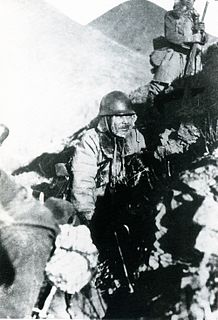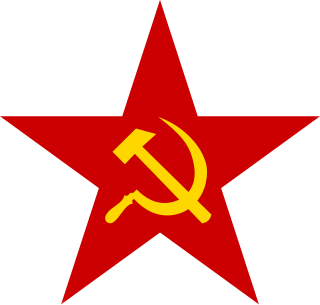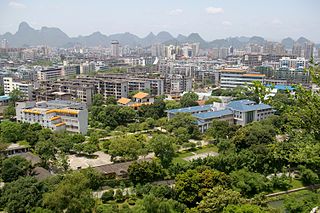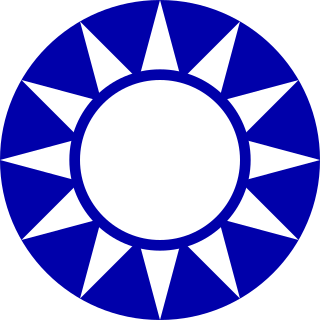
Sòng Zhéyuán (宋哲元) was a Chinese general during the Chinese Civil War and Second Sino-Japanese War (1937–1945).
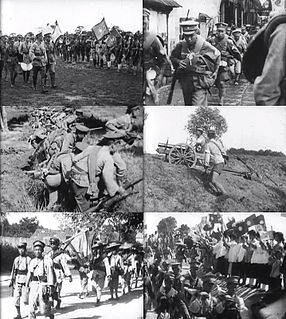
The Northern Expedition was a military campaign launched by the National Revolutionary Army (NRA) of the Kuomintang (KMT), also known as the "Chinese Nationalist Party", against the Beiyang government and other regional warlords in 1926. The purpose of the campaign was to reunify China, which had become fragmented in the aftermath of the Revolution of 1911. The expedition was led by Chiang Kai-shek, and was divided into two phases. The first phase ended in a 1927 political split between two factions of the KMT: the right-leaning Nanjing faction, led by Chiang, and the left-leaning faction in Wuhan, led by Wang Jingwei. The split was partially motivated by Chiang's purging of communists within the KMT, which marked the end of the First United Front. In an effort to mend this schism, Chiang Kai-shek stepped down as the commander of the NRA in August 1927, and went into exile in Japan.

Li Zongren or Li Tsung-jen, courtesy name Delin, was a prominent Guangxi warlord and Kuomintang (KMT) military commander during the Northern Expedition, Second Sino-Japanese War and Chinese Civil War. He served as vice-president and acting President of the Republic of China under the 1947 Constitution.
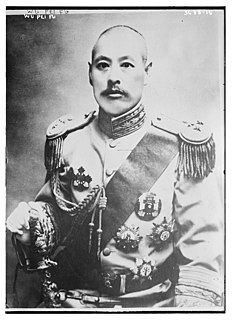
Wu Peifu or Wu P'ei-fu, was a major figure in the struggles between the warlords who dominated Republican China from 1916-27.

Huang Fu was a general and politician in early Republic of China.

Zhang Zhizhong or Chang Chih-chung was a military commander in the National Revolutionary Army of the Republic of China. He was born in Chaohu, Anhui, and attended the Baoding Military Academy from which he graduated in 1916. He attended Shanghai University in 1923 for one year. He then served in the local warlord armies of Yunnan and Guangxi before heeding the call of Nationalist leader Sun Yat-sen and moving to Guangzhou to become an instructor at the Whampoa Academy. He participated in the Northern Expedition, and after the Nationalists established the new republican government in Nanjing, became the commandant of the Central Military Academy. He joined in Generalissimo Chiang Kai-shek's campaign against Yan Xishan and Feng Yuxiang, and led the 5th Army in the 1932 battle at Shanghai against Japan. Later as the head of the 9th Army Group (第九集團軍), Zhang supervised the defence of Shanghai against Japan in 1937. Zhang is generally regarded as one of Chiang's close confidants.

Zhang FakuiCBE was a Chinese Nationalist general who fought against northern warlords, the Imperial Japanese Army and Chinese Communist forces in his military career. He served as commander-in-chief of the 8th Army Group and commander-in-chief of NRA ground force before retiring in Hong Kong in 1949.
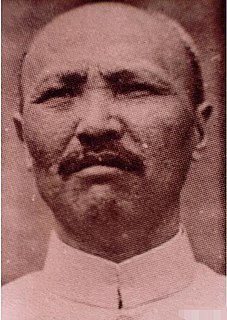
Sun Dianying was a Chinese bandit leader, warlord, and National Revolutionary Army commander who fought in the Warlord Era, Second Sino-Japanese War, and Chinese Civil War, earning notoriety for changing sides multiple times in course of these conflicts.

The Central Plains War was a series of military campaigns in 1929 and 1930 that constituted a Chinese civil war between the Nationalist Kuomintang government in Nanjing led by Generalissimo Chiang Kai-shek and several regional military commanders and warlords that were former allies of Chiang.

Pang Bingxun was a high-ranking nationalist military commander who fought against the Imperial Japanese Army and Chinese Communist Army. He stopped the IJA 5th Division led by General Seishirō Itagaki, one of the principal architects of the 1931 Manchurian incident, from capturing Linyi and converging with General Rensuke Isogai's IJA 10th Division at Tai'erzhuang District, foiling their plan to assault Xuzhou.
The Shanghai massacre of April 12, 1927, known commonly in China as the April 12 Incident, was the violent suppression of Communist Party of China (CPC) organizations in Shanghai by the military forces of Chiang Kai-shek and conservative factions in the Kuomintang. Following the incident, conservative KMT elements carried out a full-scale purge of Communists in all areas under their control, and even more violent suppression occurred in Guangzhou and Changsha. The purge led to an open split between left and right wing factions in the KMT, with Chiang Kai-shek establishing himself as the leader of the right wing faction based in Nanjing, in opposition to the original left-wing KMT government based in Wuhan led by Wang Jingwei.

Ji Hongchang, born Ji Hengli, was a Chinese general and patriot.
The Inner Mongolian Campaign in the period from 1933 to 1936 were part of the ongoing invasion of northern China by the Empire of Japan prior to the official start of hostilities in the Second Sino-Japanese War. In 1931, the invasion of Manchuria secured the creation of the puppet state of Manchukuo and in 1933, Operation Nekka detached the province of Jehol from the Republic of China. Blocked from further advance south by the Tanggu Truce, the Imperial Japanese Army turned its attention west, towards the Inner Mongolian provinces of Chahar and Suiyuan, with the goal of establishing a northern China buffer state. In order to avoid overt violation of the Truce, the Japanese government used proxy armies in these campaigns while Chinese resistance was at first only provided by Anti-Japanese resistance movement forces in Chahar. The former included in the Inner Mongolian Army, the Manchukuo Imperial Army, and the Grand Han Righteous Army. Chinese government forces were overtly hostile to the anti-Japanese resistance and resisted Japanese aggression only in Suiyuan in 1936.
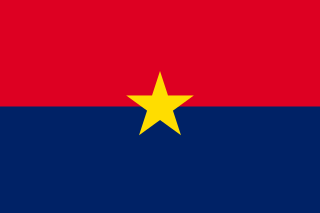
The Fujian People's Government is the common name for the People's Revolutionary Government of the Republic of China (1933–1934), also known as the Fujian People's Government, was a short-lived anti-Kuomintang government in the Republic of China's Fujian Province. The rebellion that led to its formation and its collapse are known as the Fujian Incident or Fujian Rebellion.

Li Liejun, was a Chinese revolutionary leader and general in the early Republic of China.

Li Jishen was a Chinese military commander and statesman. He served as commander of the Fourth Army of the Republic of China, governor of Guangdong, military affairs commissioner, and acting president of the Whampoa Military Academy. After opposing Chiang Kai-shek and being expelled from the Kuomintang in 1947, he became one of the six Vice Chairmen of the Central People's Government of the People's Republic of China with that government's founding on October 1, 1949.
Chow Chih was a general for Dr. Sun Yat-sen and a four-star general for Chiang Kai-shek during the Chinese Civil War and second Sino-Japanese War. He is also known as Chou Chih or Zhou Zhi in Mandarin. Chow Chih was a military strategist who led 100 battles in Canton and was introduced by Chiang Kai-shek at a 1942 anti-Japan planning conference as a soldier with great achievements in all the military arts.

He Xiangning was a Chinese revolutionary, feminist, politician, painter, and poet. Together with her husband Liao Zhongkai, she was one of the earliest members of Sun Yat-sen's revolutionary movement Tongmenghui. As Minister for Women's Affairs in Sun's Nationalist government in Guangzhou (Canton), she advocated equal rights for women and organized China's first rally for International Women's Day in 1924. After her husband's assassination in 1925 and Chiang Kai-shek's persecution of the Communists in 1927, she stayed away from party politics for two decades, but actively worked to organize resistance against the Japanese invasion of China.

The war in Ningxia of 1934, also known as Sun Dianying Campaign, was a minor civil war for control over the Republic of China's province of Ningxia, fought between the warlord Sun Dianying and an alliance against him, consisting of the Ma clique, Governor Yan Xishan of Shanxi, and the Nationalist government of China. The conflict erupted as the unintended consequence of a plan by China's supreme leader, Chiang Kai-shek, to weaken the Ma clique, and resulted in the destruction of Sun Dianying's private army.








